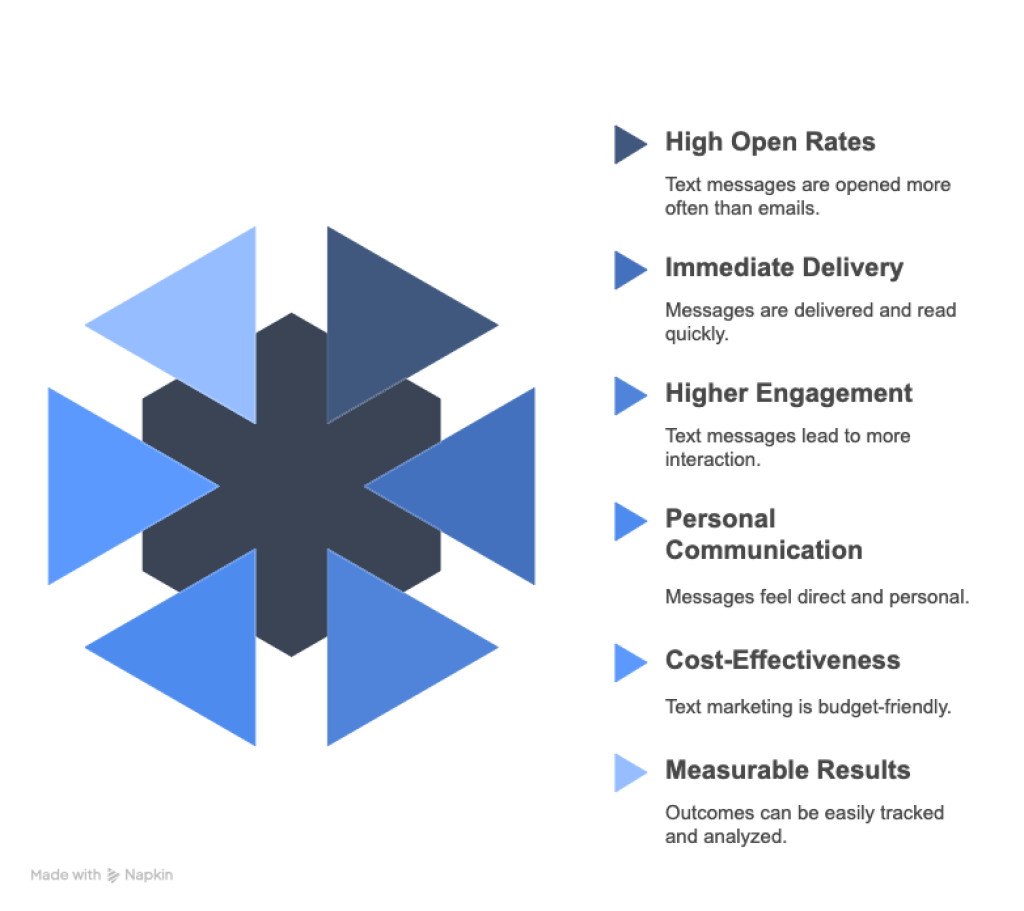
How to Choose a Text Message Marketing Service
Let’s face it – picking SMS marketing for small business can feel overwhelming. With dozens of options out there, how do you know which one will actually deliver value? After years of testing various platforms, including SMS customer service software solutions, I’m here to cut through the noise and show you what matters.
What Are Some Features of Text Messaging Services I Should Look For?
Before diving into specific platforms, let’s talk about what separates basic texting tools from professional white label SMS software. Here are the essential features to consider:
Core Features
- Templates & Customization: Look for customizable templates that sound human, not robotic
- List Management: Smart segmentation for targeted messaging
- Automation Tools: Easy-to-use automation for welcome series and drip campaigns
- Analytics Dashboard: Clear data on performance metrics
- Two-way Messaging: Enable real conversations with customers
- Keyword Management: Let customers text specific words to join lists
- Mobile Access: Send messages on the go
- MMS Capabilities: Support for images and rich media
Best SMS Marketing Platforms
1. TextMagic
Best for: Small businesses wanting simplicity
TextMagic is an intuitive, no-frills SMS platform ideal for small teams that want to send text messages quickly without a steep learning curve. It offers a reliable pay-as-you-go pricing model, which is appealing for budget-conscious users or those testing SMS for the first time.
- Pros: Easy-to-navigate dashboard, reliable delivery, strong reporting tools
- Cons: Limited MMS capabilities, customer support response time can vary
Expert Insight: If you’re looking for a simple, effective SMS platform without the overhead of subscriptions or advanced automation, TextMagic is a great starting point.
2. SlickText
Best for: Growing businesses
SlickText combines ease of use with sophisticated features like autoresponders, drip campaigns, and workflow automation. It’s ideal for businesses that are starting to scale and need more than just mass texting.
- Pros: Excellent onboarding and customer support, automation tools
- Cons: Premium features can get expensive at higher volumes
Expert Insight: SlickText strikes a strong balance between functionality and usability, making it a solid choice for companies growing into more complex SMS strategies.
3. SimpleTexting
Best for: Multimedia messaging needs
SimpleTexting offers a comprehensive feature set for businesses that want to send engaging messages—including polls, surveys, and MMS content. It’s built with versatility in mind.
- Pros: Robust MMS capabilities, built-in audience segmentation, two-way messaging
- Cons: Slightly steeper learning curve for beginners
Expert Insight: If your marketing depends on visual content or interactive messaging, SimpleTexting delivers on both power and flexibility.
4. EZ Texting
Best for: CRM integration
EZ Texting focuses on helping businesses align their SMS outreach with existing CRM systems. With built-in integrations and templated campaigns, it’s ideal for streamlining marketing and sales workflows.
- Pros: Excellent CRM compatibility, prebuilt message templates
- Cons: Interface feels outdated, premium plans are costly
Expert Insight: Companies that rely on customer relationship tools will appreciate the depth of integration options, though the interface could use modernization.
5. Attentive Mobile
Best for: Enterprise e-commerce
Attentive offers one of the most advanced SMS marketing platforms in the market, tailored specifically to enterprise retailers. It delivers personalized messaging based on customer behavior and real-time data.
- Pros: Cutting-edge personalization tools, detailed analytics, A/B testing
- Cons: Requires a longer setup and onboarding time, higher pricing
Expert Insight: Best suited for large e-commerce brands with technical teams or agency partners to fully unlock its robust capabilities.
6. Textedly
Best for: Budget-conscious businesses
Textedly is an affordable option that gets the basics right. With no complicated setup, it’s perfect for businesses that want a lean, reliable SMS tool.
- Pros: Transparent pricing, reliable for basic campaigns
- Cons: Lacks features like automation and detailed analytics
Expert Insight: For brands focused on budget and simplicity over sophistication, Textedly offers solid value for money.
7. Postscript
Best for: Shopify integration
Postscript is built for e-commerce—and more specifically, for Shopify stores. It integrates deeply into the Shopify ecosystem, allowing real-time SMS triggers based on cart activity, order updates, and customer actions.
- Pros: Seamless Shopify connection, powerful automation
- Cons: Platform-specific, higher pricing tiers for volume senders
Expert Insight: If you operate a Shopify store and want advanced SMS marketing tied directly to customer behavior, Postscript is purpose-built for that need.
8. Yotpo (formerly SMSBump)
Best for: E-commerce marketing
Now part of the Yotpo ecosystem, this SMS platform leverages strong integrations and performance tracking to help e-commerce businesses convert and retain customers through mobile messaging.
- Pros: Dynamic segmentation, product-based triggers, advanced attribution
- Cons: Can feel complex for non-technical users
Expert Insight: Yotpo SMS is ideal for performance marketers who want granular control over their messaging strategies, particularly in DTC e-commerce.
9. Octane AI
Best for: AI-powered messaging
Octane AI blends artificial intelligence with SMS to deliver smart conversations, personalized recommendations, and even quiz-based product discovery flows.
- Pros: Personalization at scale, great for conversational commerce
- Cons: Learning curve for setup, expensive for smaller brands
Expert Insight: For brands investing in conversational commerce and AI, Octane AI offers an innovative approach that’s future-ready.
10. Podium
Best for: Local businesses
Podium is a broader platform that includes review management, messaging, and payment tools—making it an all-in-one solution for local service businesses looking to streamline customer interaction.
- Pros: Combines SMS with customer reviews, web chat, and payments
- Cons: Platform may include more features than necessary for SMS-only needs
Expert Insight: For service-based businesses like dental clinics, auto shops, or home services, Podium’s suite simplifies multiple tasks into one system.
11. Omnisend
Best for: Multi-channel marketing
Omnisend is a powerful marketing platform that includes SMS alongside email, push notifications, and more. It’s designed for users who want coordinated campaigns across channels.
- Pros: Unified view of customer communication, advanced automation
- Cons: SMS is not its core feature, fewer SMS-specific optimizations
Expert Insight: If SMS is just one part of your larger omnichannel marketing strategy, Omnisend offers excellent cross-channel cohesion.
What is SMS Marketing? What Does Text Message Marketing Do?
SMS marketing uses text messages to reach customers with promotions, updates, and engagement campaigns. It’s a direct line to your audience’s most personal device, making it incredibly powerful when used correctly.
SMS vs. Text Messaging vs. MMS
- SMS: Standard text messages (160 characters)
- Text Messaging: General term for all mobile messaging
- MMS: Multimedia messages (images, videos, longer text)
What Are the Benefits of Using Text Message Marketing?

SMS Marketing Best Practices
SMS marketing can be one of the most effective channels for customer engagement—when done correctly. It’s a direct, high-conversion medium, but because of its immediacy and personal nature, it demands a thoughtful and respectful approach. Below are foundational best practices every business should follow to ensure compliance, maintain trust, and maximize performance.
Get Clear Context: Always obtain explicit, documented consent before sending any marketing messages. This isn’t just a legal requirement under laws like TCPA and GDPR—it’s also the foundation of respectful communication. Use double opt-ins where possible to validate interest and reduce complaints.
Times Message Appropriately: Avoid sending messages too early in the morning or late at night. Stick to typical business hours, and consider time zones when scheduling sends. Respecting your audience’s routine helps avoid frustration and keeps engagement high.
Provide Value in Every Message: Every message should have a purpose. Whether it’s a discount, exclusive content, a reminder, or a limited-time offer, ensure the recipient gains something from the interaction. Value-driven messaging builds loyalty and reduces opt-outs.
Make Opting Out Easy: Always include a clear opt-out method (e.g., “Reply STOP to unsubscribe”). This isn’t just a compliance issue—it’s a customer service one. Making it easy to unsubscribe increases trust and protects your sender reputation.
Personalize When Possible: Use available data to personalize messages by name, location, or past purchases. Even simple personalization can significantly increase click-through rates and customer satisfaction.
Keeps Messages Concise: SMS has a strict character limit, but more importantly, your audience has limited attention. Aim for clarity over cleverness. Get to the point quickly while keeping your tone aligned with your brand.
Test and Measure Results: Regularly A/B test different elements—timing, language, offers, call-to-action phrasing—to understand what drives the best results. Monitor metrics like open rates, click-throughs, and conversions to continually optimize campaigns.
Respect Frequency Preferences: Don’t over-message your audience. Start with a manageable cadence—once or twice a week—and adjust based on engagement data and feedback. Excessive messaging is the fastest way to trigger unsubscribes.
Best Text Message Marketing Tools Conclusion
Choosing the right SMS platform depends on your specific needs, budget, and technical requirements. Consider starting with platforms like TextMagic or SlickText if you’re new to SMS marketing, or explore enterprise solutions like Attentive Mobile if you need advanced features.
Additional Resources
- Mobile Marketing Watch’s SMS Guide
- Campaign Monitor’s SMS Statistics
- G2’s Software Rankings
- Twilio’s Best Practices
Remember: Start with your business goals, choose a platform that matches your needs, and focus on providing value to your subscribers.










